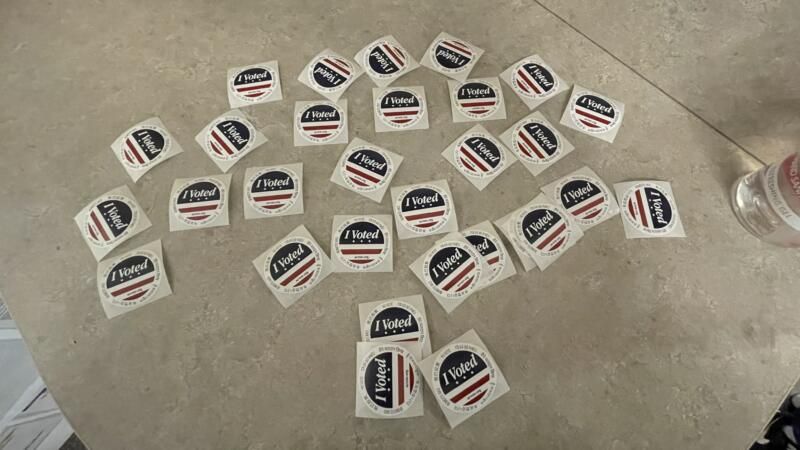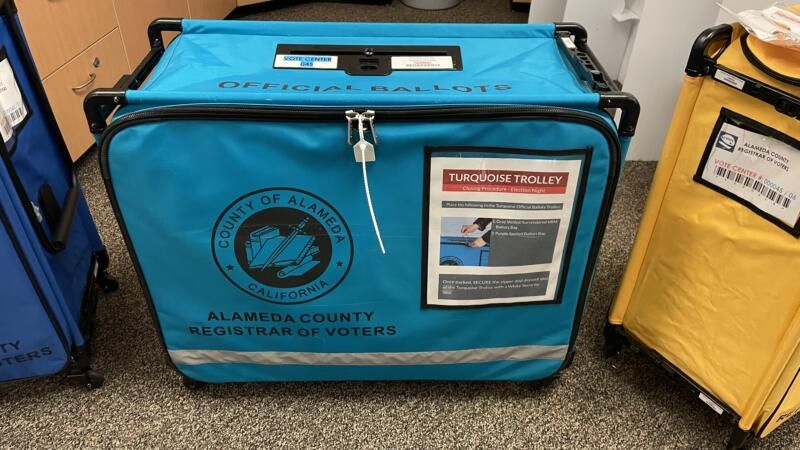Is Climate Change Being Considered by Voters?
An official ballot box in Fremont, Calif. (Janam A. Gupta/Siliconeer).
Welcome to the 2024 Presidential Election. With roaring concerns over the economy and safeguarding democracy have largely overshadowed climate change as a priority for voters. So here is a quick reminder for those of you that forgot.

In a media briefing on November 1, hosted by Ethnic Media Services, a panel of experts discussed the growing crisis inflicted upon us by climate change.
Speakers

- Erik Bendix, a resident of Asheville, North Carolina
- Sharon Lavigne, Founder of Rise St. James, recipient of the Goldman Environmental Prize
- Bill McKibben, Founder of Third Act
- Sissy Trinh, Executive Director at Southeast Asian Community Alliance
The planet, however, stands at a critical juncture, with potentially irreversible changes on the horizon, warns Bill McKibben.
“The last 18 months on our planet have seen not the steady rise in temperature that we’ve been observing for decades, but a very dramatic spike in the temperature of the earth and the temperature of the oceans,” he said. “This augers very badly for what’s happening in the next few years as the poles melt, as the seas rise.”
Facing a New ‘Great Extinction’
“Climate change is the biggest thing that humans have ever done by far. And if we don’t get it under control very soon, biologists say we will be kicking off, among other things, the sixth great extinction in the history of this planet. We can see all those extinctions in the geological record.”
McKibben also believes the outcome of the 2024 presidential election could have consequences lasting a million years.
Low Priority in Polls
Despite the urgency of climate issues, climate change remains low on voters’ priority lists. In an October 9 Gallup poll, 52% of respondents identified the economy as “extremely important” in choosing a presidential candidate, with democracy, national security, and potential Supreme Court appointments also ranking high. In contrast, only 21% of voters viewed climate change as “extremely important,” placing it near the bottom of concerns.
Hurricane Helene: Firsthand Experience of Climate Impact
For Erik Bendix, the devastation of climate change hit close to home. Tornadoes that followed Hurricane Helene in late September tore through the area, leaving destruction in their wake. It took 19 days to restore power, and centuries-old forests were devastated. Asheville’s North Carolina Arboretum, a popular destination, lost over 20,000 trees. “It’s like a moonscape here,” he described.
Hurricane Helene caused 227 fatalities and inflicted approximately $95 billion in property and agricultural damages. On the day of Bendix’s report, a similarly catastrophic downpour in Spain led to hundreds more deaths.
Addressing Climate Inequity
Lower-income communities are often the hardest hit by climate change. President Joe Biden’s Inflation Reduction Act includes a $152 million grant for the Community Change Grants Program, marking a historic investment in environmental and climate justice.
For Sharon Lavigne in Louisiana’s “Cancer Alley,” these funds represent a starting point in efforts to clean up her community. Rise St. James led efforts to prevent a new petrochemical plant from being built in her already heavily polluted area. Cancer Alley, an 85-mile stretch along the Mississippi River, is home to around 200 fossil fuel and petrochemical facilities, with residents facing elevated risks of cancer, asthma, and other health issues.
Currently, Rise St. James is engaged in a fight against Formosa Plastics, which plans to construct a multibillion-dollar factory on land holding Lavigne’s ancestral graves.
Corruption and Environmental Harm
Our community literally is dying. We go to these meetings, we talk about it, and nothing is being done,” said Lavigne. “These people, politicians and industry have the power over the people.
Louisiana Governor Jeff Landry has supported Formosa Plastics, filing a lawsuit against the EPA in December to prevent intervention in the factory’s construction.
“If these industries come in, we will not live,” Lavigne said tearfully, urging Governor Landry to stop the pollution. A large rally organized by Rise St. James is planned for November 22 to demand action from state leaders.
Los Angeles River
In Los Angeles, Sissy Trinh emphasizes the importance of making climate change feel relevant to low-income communities. Many residents in her area struggle to afford basic needs, with some older residents working in poorly paid jobs. “And so when you talk about climate change, it feels very far away,” Trinh explained. “They have more immediate needs. They’re facing the threat of homelessness. And so to talk about climate change seems almost dismissive to the threat that’s right there in front of them.”
Trinh’s neighborhood, situated near the Los Angeles River, also faces gentrification. Plans to clean and green the river have attracted developers, raising the threat of displacement for current residents. “We have had to explain how these climate investments were having a destabilizing impact for our communities,” she said.
Trinh envisions climate action as an opportunity to address other interconnected issues like poverty. “How do we create policies to minimize developer speculation, and then also direct investments to support low income residents and small businesses so that we uplift people out of poverty?”she asked. “So that’s how I kind of see climate change: an opportunity to address these other issues that feel separate, but really aren’t.”
There is still time to put in a word on who the next president is, so America, let’s get going and vote our hearts out.


